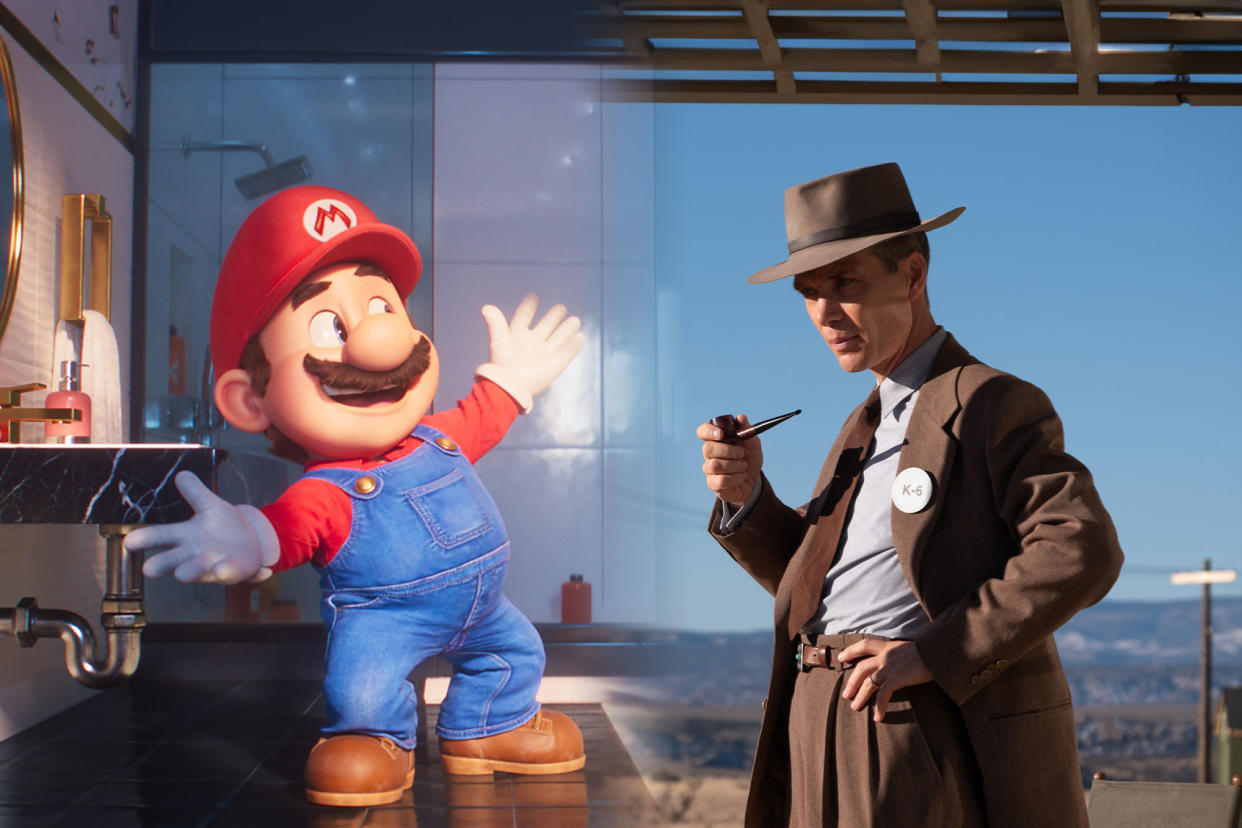"Barbie," Oppie and . . . Mario?: Why the Golden Globes mean even less than before

Break out the reggaeton air horn and fire a few pew-pew-pews! into the air from your finger guns, because the Golden Globes are back, baby!
What? You thought we were done with all that? Silly . . . no, only NBC is finished with it. Hollywood may have defenestrated the Hollywood Foreign Press Association’s influence over the second most important awards show in film – TV, not so much – but nobody’s giving up a chance to get litty for the cameras in the Beverly Hilton’s International Ballroom.
2023 has been a tough year for all, but think of the actors sidelined by the SAG-AFTRA strike – think of them! For four months they could not promote their movies and flex their fashion muscle. Imagine the pent-up sequin energy that will be released on that red carpet next month.
CBS must be, along with hoping the public is excited enough to defy declining viewership trends for this telecast and awards shows in general. Among those who follow what’s happening in the industry the 2024 Globes has a curiosity factor attached to it, being the first to not be produced by the HFPA.
After a 2021 Los Angeles Times report dove into that organization’s racist exclusion of Black members along with numerous ethical lapses and evidence of financial mismanagement, NBC dropped the 2022 telecast like a bad boyfriend. In 2023 it welcomed it back to see what would happen. Host Jerrod Carmichael opened the evening with, "I'll tell you why I'm here: I'm here 'cause I'm Black.”
Guess who wasn’t there? Interested people watching at home. The 2023 broadcast drew an audience of around 6.3 million, a new low after the record low set by the 2021 mid-pandemic telecast, which came in 68% lower than 2020’s viewership.
But the 2024 Globes has two curiosity factors it didn’t before. One is the dominance of Barbenheimer, manifesting in “Barbie” and “Oppenheimer” leading the film categories in total nominations and “Succession” dominating TV with nine, as announced on Monday. The second, relatedly, may be seeing whether creative vision holds a higher standing than audience popularity.
“Barbie” and “Oppenheimer” drew the public out of their homes and into theaters over the summer, potentially elevating the public’s interest in watching to see if they take home top awards on Sunday, Jan. 7. Both are up for best motion picture in their respective categories – “Barbie” in musical or comedy, and “Oppenheimer” in drama, with Margot Robbie in the running for best musical or comedy actress and Cillian Murphy up for best drama actor.
Film nominations have more of an impact on Oscar season than TV nods, although the tie enjoyed by “Only Murders in the Building,” “The Bear” and “The Crown,” which each landed five noms, is certainly nice.
Martin Scorsese’s latest opus, “Killers of the Flower Moon” is up for best motion picture drama alongside “Anatomy of a Fall,” “Maestro,” “Oppenheimer,” “Past Lives” and “The Zone of Interest.” This may be some comfort to him. He also has fine company in the best director race with Bradley Cooper (“Maestro”), Greta Gerwig (“Barbie”), Yorgos Lanthimos (“Poor Things”), Nolan, and Celine Song (“Past Lives”).
The top comedy film category is similarly typical with “Air” joined by “American Fiction,” “The Holdovers,” “May December” and “Poor Things.”

This year’s TV selections reflect a respectable crossover between critical assessment and popularity, contradicting the prevailing past tendency for the HFPA to reward either new shows, i.e. the ones voters were most likely to have heard of, or the ones that, for instance, flew them to Paris. (“Emily in Paris,” we’re looking at you.)
Settling in beside “Succession” in the battle for top drama are “The Crown,” “The Diplomat,” “The Last of Us,” “The Morning Show,” and, owing to the Harrison Ford-Helen Mirren-Taylor Sheridan of it all, “1923.” The comedy entries are more gratifying, with “Abbott Elementary,” “Barry,” “Jury Duty” and repeat nominee “Ted Lasso” joining “Only Murders” and “The Bear,” which is not a comedy.
Even so, the Globes’ relevance as a determinant of artistic excellence has always been questionable and remains so even now. Perhaps especially now.
The 81st annual Golden Globe Awards will be first produced by Dick Clark Productions and Eldridge Industries, the private equity firm that joined DCP in acquiring the HFPA’s assets in June, transforming the HFPA into a for-profit endeavor. Eldridge is owned by billionaire investor Todd Boehly, a part owner of the LA Dodgers and DraftKings, a major investor in A24, and . . . well, hello . . . has a stake in the Beverly Hilton (where the Globes are held).
Dick Clark Productions, meanwhile, is owned by Penske Media Corporation, which also owns every major Hollywood trade including Variety, IndieWire, Rolling Stone, Deadline and The Hollywood Reporter, along with a slice of Vox Media as of February.
No levelheaded person should expect these entities to inject legitimacy into this black hole of self-congratulation. Under the new owners, Globe voters are also employees receiving $75,000 a year to screen TV and film submissions along with maintaining the HFPA website and other busywork.
Those series and movie submissions are part of an awards campaign process that involves mounting expansive ads and scoring coverage placement in the aforementioned trade publications. Stars and producers also participate in For Your Consideration appearances and roundtables featured in online and print editions of those outlets.
Realistically, the average person doesn’t care about potential conflicts of interest, and notions of ethical sanctity only come up as punchlines when it comes to the Globes. For the people who bother to watch, the Globes offers a little post-holiday glitz to break up the winter blues, along with the chance to see celebrities give network censors a workout on (slightly time-delayed) live TV.
The Globes still project some reputational sheen as a bellwether for the Oscars race, or it used to, which lends additional dubiousness to its new categories introduced for the 2024 show.
The "best cinematic and box office achievement" category makes its first appearance this year, acknowledging the vox populi as a determinant of defining good moviemaking. Similar logic gave us “The Flash Enters The Speed Force” from the “Justice League” Snyder cut prominent placement in the 2022 Oscars.
One can only imagine what Scorsese makes of seeing Christopher Nolan’s “Oppenheimer” placed on the same level as “The Super Mario Bros. Movie,” “John Wick: Chapter 4” or his personal cancer, a Marvel flick, i.e. “Guardians of the Galaxy Vol. 3.”
Out of all that category’s nominees, Greta Gerwig’s “Barbie” is an aesthetic wonder, and one most likely to have been seen by regular people. If it wins, its victory could be attributed to that, or the fact that it was Warner Bros.’ highest-grossing global release in its 100-year existence. Either way, it leads one to question how this reconfigured awards body assigns value to art.
“Barbie” adapts one of the best-loved toys in history to the screen, the same as “The Super Mario Bros. Movie.” Out of all the best cinematic and box office achievement nominees, only “John Wick” is derived from a vision that originated as a movie. Quality-wise, it was also one of the franchise’s least satisfying entries. So what role does popularity, exemplified here in terms of product ubiquity, play in determining merit?
Similar questions might be asked concerning the other new category: best performance in stand-up comedy on television. If TV has grown into a massive field, so has stand-up comedy’s presence on the small screen. Globes voters and other awards juries also used to treat TV like the industry’s stepchild. It has since become the favored medium among actors. Even Globe-nominee and perennial movie presence Nicolas Cage (up for his work in “Dream Scenario”) wants to work there.
Now voters take TV seriously. From what we can tell of this category’s nominees, all of them headliners, stand-up comedy is where Globes voters seem content to be lazy. Does former Globes host Ricky Gervais deserve a nomination for “Armageddon”? Debatable (but not really . . . no).
Want a daily wrap-up of all the news and commentary Salon has to offer? Subscribe to our morning newsletter, Crash Course.
Trevor Noah’s latest, “Where Was I,” has yet to hit Netflix; it could be outstanding. Chris Rock’s “Selective Outrage” was mainly noteworthy for being streamed live and including his long-awaited response to being slapped by Will Smith onstage at the 2022 Oscars. Amy Schumer’s “Emergency Contact,” Sarah Silverman’s “Someone You Love” and Wanda Sykes’ "I'm an Entertainer" were all fine.
Stand-up comedy has exploded on streaming, granting exposure to riotously funny relative unknowns, some of whom cranked out sets hilarious enough to hurt. They are not in this group.
But then, maybe it’s not even an honor to just be nominated here, indicated by the fact that the production is struggling to find an emcee. CNN reports that Rock, Globe nominee Ali Wong (up for her performance in “Beef”) and “SmartLess” podcast collaborators Will Arnett, Sean Hayes and Jason Bateman all turned down invitations to host.
The Globes have gone host-free before, which they may do again this time; a celebrity-filled roster of guests and presenters doesn’t guarantee the audience will come with it. The telecast has always had those factors going for it, and that didn’t stop the public’s interest from plummeting. The Golden Globes’ new custodians probably won’t solve its lingering problem with mainstream relevancy. Never mind – it's the movies that were meant for us. This party never was.
The 81st annual Golden Globe Awards airs live at at 5 p.m. PT/8 p.m. ET. on Sunday, Jan. 7, 2024, on CBS and streams on Paramount+.
